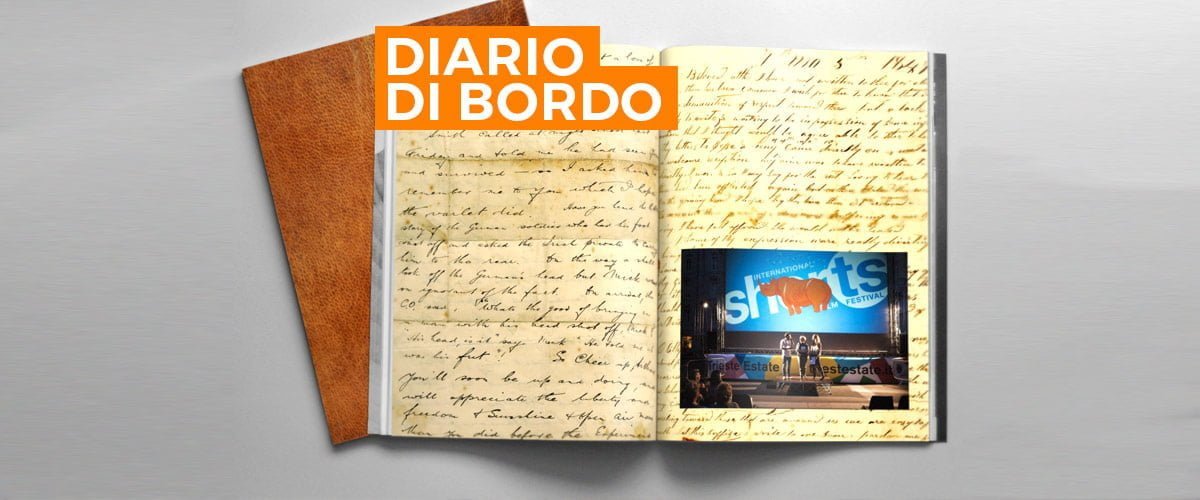Diario di bordo – Day 07
Thursday 07 july – Day 07
Snapshots of a festival. Many hands to shake, people to meet for the first time or see again after a long separation; a luna-park of sensations that are perhaps impossible to describe.
It’s very hot, perhaps even extremely hot, and appropriate refreshment can be provided by the evening’s screenings. Oh, the infinite seductive power of cinema!
A literal departure…with the car crash of professional ups and downs of the protagonist in Michael Binz’s Herman the German…comes from Germany and allows us to laugh humorously at the fears and idiosyncrasies that can be unleashed in the bizarre corridor of the human psyche.
The cinematographic colour of the evening veers decidedly towards pitch black with Yasir Kareem’s Kingdom of Garbage.
We are faced with a piercing series of events in which children are social martyrs and every right they have is ignored.
Tasty like a tortilla and inebriating like a glass of sangria, here a Mexico populated by singing animals comes to the screen in Los ases del corral.
Directed by the young pair of Sevilla and Báez and centred around a highly colourful jukebox, a singular, chilli flavoured tension unfolds.
Bringing with it the solemn cadence of a Greek tragedy is Russian director Taya Zubova’s Ryba Moya…before our eyes is an authentic visual symphony which talks about pregnancy, where water becomes the narrative modus operandi in a succession of beautiful images of multi-coloured nights without darkness and dances, right up until the final catharsis of a new birth.
Theatre – or rather one-room cinema – next in Chris Chalklen’s Draft Eight, where, in a bourgeois salon reminiscent of the style of Harold Pinter, a character confronts his own regrets, sustaining a captivating verbal architecture.
In Italy, this duplicity could have been brilliantly acted by our own best stage actors, such as Glauco Mauri and Roberto Sturno, in the desire of creating a small game of quotations.
An animated short, Siniša Mataić’s Penjači transports us into a world of adrenaline, where two young climbers on a constant search for thrills end up having to seriously reconsider their own existence.
We feel sincere affection when confronted by a sweet old lady who takes scrupulous care of a public toilet. In her little world of simple people, the sense that there is a magnificent granny trunk overflowing with precious objects persists. All of this is executed with aplomb in Laura Luchetti’s animated short, Bagni.
The atmosphere of a prison turns all kinds of conventions and habits on their heads, obliterating personal microcosms and forcing you to stay loyal with instances you had never previously considered.
With a wise helping of emotions, the French auteur Laurent Scheid tells the story of these expressive knots in Tout va bien.
Brando De Sica is notoriously a young son of art, but he already demonstrates an understanding of the narrative possibilities of the cinematographic medium. His short Non senza di me also has the merit of bringing us a good dramatic effort from Max Tortora, an actor generally known for his ironic works. The ending is truly unexpected in this truly saucy thriller.
Next to be shaken up is the theme of physical disability, and of the legitimate needs of this delicate portion of the population. Hole, by Canadian Martin Edralin, is a Swan Lake from uneven shores.
Desecrating political satire is proposed by Frenchman Aurélien Laplace in Une poignée de main historique. As always happens when the characters in question are very well known, the laughs come from observing how history can hold very witty gags, both small and large.
Quando a Roma nevica by Andrea Baroni brings us back to a wholly Italian context through a vibrantly violent series of events set in a less picture-postcard version of the Italian capital.
Scenes of brutal beatings and agitated cries with a message behind them: there is no interpersonal reality that doesn’t connect sooner or later to that community in an inexorable societal chain.
A light with beautiful purple hues illuminates a Piazza Verdi still brimming with filmgoers, whilst many other images have just been seen at Cinema Ariston; without doubt they will be talked about again.
Claude Chabrol, who is perhaps one of the best known directors from the French New Wave, said that sharing cinema as perfect as a cup of strawberries is demanding when it comes to having the correct portion of whipped cream.
We could not agree more and, at the same time, we too invite you to live the main part of ShorTS International Film Festival, Trieste, with us.
Let the screenings go on! Next stop: Friday night.
Riccardo Visintin




Leave a Reply
Want to join the discussion?Feel free to contribute!